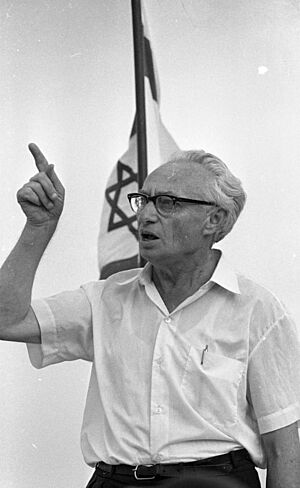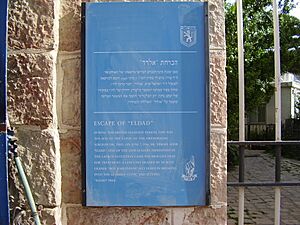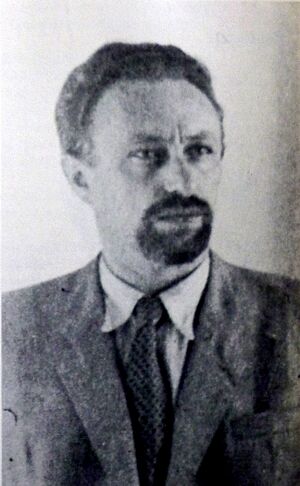Israel Eldad facts for kids
Quick facts for kids
Israel Eldad
|
|
|---|---|
 |
|
| Native name |
ישראל אלדד
|
| Born | Israel Scheib 11 November 1910 Pidvolochysk, Galicia and Lodomeria, Austria–Hungary |
| Died | 22 January 1996 (aged 85) Jerusalem, Israel |
| Pen name | Sambatyon, Eldad |
| Citizenship | Israel |
| Alma mater | University of Vienna |
Israel Eldad (born Israel Scheib; 11 November 1910 – 22 January 1996) was an important Israeli thinker and a member of a Jewish underground group called Lehi in Mandatory Palestine. He was a strong supporter of Revisionist Zionism, which believed in establishing a Jewish state in the Land of Israel. Eldad played a key role in the fight for Israel's independence.
Contents
Early Life and Education (1910-1939)
Israel Scheib was born in 1910 in a town called Pidvolochysk, in a region then known as Galicia. His family was Jewish and followed traditional customs. During World War I, his family had to move around as refugees. In 1918, when he was young, he saw a sad funeral for Jews who had been killed in a violent attack called a pogrom.
After finishing high school, Israel Scheib went to a special school for religious studies in Vienna. He also studied at the University of Vienna. He earned a high degree called a doctorate, but he decided not to become a rabbi.
Around this time, he became very interested in the idea of a Jewish homeland. He joined his father at a protest outside the British Consulate. This protest was about events happening in Palestine in 1929. He also met a famous poet, Uri Zvi Greenberg, who inspired him with his ideas about the Jewish people.
Teaching Career Before the War
After finishing his studies, Scheib started working as a high school teacher in Volkovisk. In 1937, he began teaching at a Teachers Seminary in Vilna, which was then part of Poland. He taught there for two years.
Zionist Activities
In Poland and Moving to Palestine
While teaching, Israel Scheib became more involved in the Betar movement, a Zionist youth group. He rose to a leadership position. In 1938, he even spoke up to defend another leader, Menachem Begin, at a conference in Warsaw.
When World War II began in 1939, Scheib and Begin escaped from Warsaw together. Begin was later arrested by Soviet police. Scheib later moved to Mandatory Palestine in 1941. This was a time when the area was under British rule.
Leading the Lehi Underground Group
In Mandatory Palestine, Israel Scheib, now using the name "Eldad," became a key leader of the Lehi underground group. This group was fighting for Jewish freedom from British rule. He worked closely with Lehi's founder, Avraham Stern.
After Stern was killed by the British, Eldad became one of three main leaders of Lehi. He worked with Natan Yellin-Mor and Yitzhak Shamir, who later became a prime minister of Israel. Eldad was known as the group's main thinker and writer. He wrote articles for secret newspapers and even speeches for Lehi members who were on trial.
The British authorities arrested Eldad in Tel Aviv. He was injured during his capture and taken to a prison hospital in Jerusalem. Even while injured, he continued to write his political and philosophical ideas from his cell. In June 1946, he managed to escape from a dentist's clinic with the help of other Lehi fighters.
During the 1948 War
During the 1948 Palestine war, Eldad remained an active leader of Lehi. He held strong opinions about how the war should be fought. He disagreed with some decisions made by other Jewish fighting groups, including the Irgun and the new Israel Defence Forces. He felt they should have fought harder in certain battles, especially for Jerusalem's Old City. To join the fight for Jerusalem, Eldad even disguised himself as a foreign journalist to get past military checkpoints.
Life After Independence
Political Involvement
After Israel became an independent state, the veterans of Lehi formed a political party called the Fighters' List. This party won one seat in the first Israeli parliament, called the Knesset, in 1949.
Eldad later taught Bible and Hebrew literature in an Israeli high school. However, the Prime Minister at the time, David Ben-Gurion, was concerned that Eldad would share his strong Lehi ideas with the students. Ben-Gurion had him dismissed from his job. Eldad went to court and won his case, but it was hard for him to find another teaching job after that.
In 1962, Eldad became a lecturer at the Technion in Haifa, a well-known university. He taught there for twenty years. From 1982, he also lectured at the Ariel University Center of Samaria.
Writing and Legacy
For 14 years, Israel Eldad published a special journal called Sulam. He also wrote many books and articles. These included his memoirs, Maaser Rishon, histories of the underground battles, and a book of Bible commentary. He also wrote weekly newspaper columns.
In 1988, Eldad received the Bialik Prize from Tel Aviv, which is a very important award for contributions to Israeli thought. By the 1990s, he was seen as a respected elder statesman among Israeli nationalists. Many of his works have been translated into English.
When Israel Eldad passed away in January 1996, his funeral was attended by important figures like Prime Minister Benjamin Netanyahu and former Prime Minister Yitzhak Shamir. He was buried on the Mount of Olives in Jerusalem, near his friend Uri Zvi Greenberg.
His Ideas and Beliefs
Israel Eldad had very clear ideas about the future of Israel.
Vision for a Jewish State
Eldad believed that the creation of the State of Israel was just a first step. He thought the true goal of Zionism was to establish what he called Malkhut Yisrael, or "the Kingdom of Israel." This meant a fully independent Jewish kingdom within the ancient biblical borders of Israel. He also believed that all Jews around the world should live there, and that the Jewish Temple should be rebuilt in Jerusalem.
Views on Jewish Life Outside Israel
Eldad strongly felt that Jewish life outside of Israel, known as the Diaspora, was not ideal and might eventually disappear. However, he still respected the history of Jewish people who lived in exile. He saw them as active and creative people, not just passive sufferers.
Awards and Recognition
- In 1977, Israel Eldad received the Tchernichovsky Prize for his excellent translations.
- In 1988, he was awarded the Bialik Prize for Jewish thought, sharing it with another scholar.
- In 1990, he received the Yakir Yerushalayim (Worthy Citizen of Jerusalem) award from the city of Jerusalem.
Today, many of Eldad's political and philosophical ideas are still supported by various organizations and political groups in Israel. A community called Kfar Eldad was named after him. His son, Aryeh Eldad, is also a well-known political figure.
Published Works
- The Jewish Revolution: Jewish Statehood (2007)
- Maaser Rishon (originally in Hebrew, 1950; English translation: The First Tithe, 2008)
- Israel: The Road to Full Redemption (1961)
See also
- List of Bialik Prize recipients
Images for kids
 | James Van Der Zee |
 | Alma Thomas |
 | Ellis Wilson |
 | Margaret Taylor-Burroughs |




